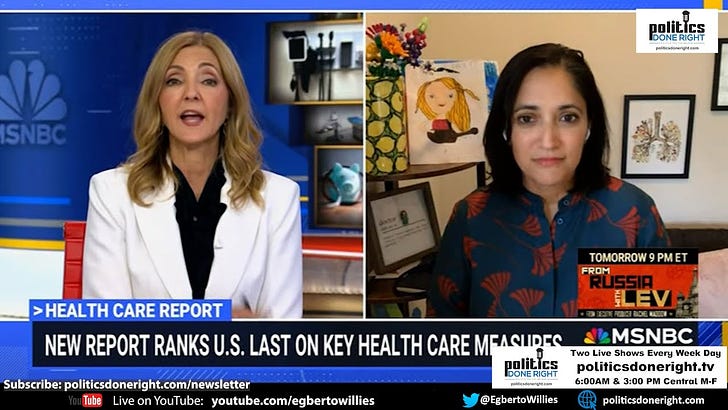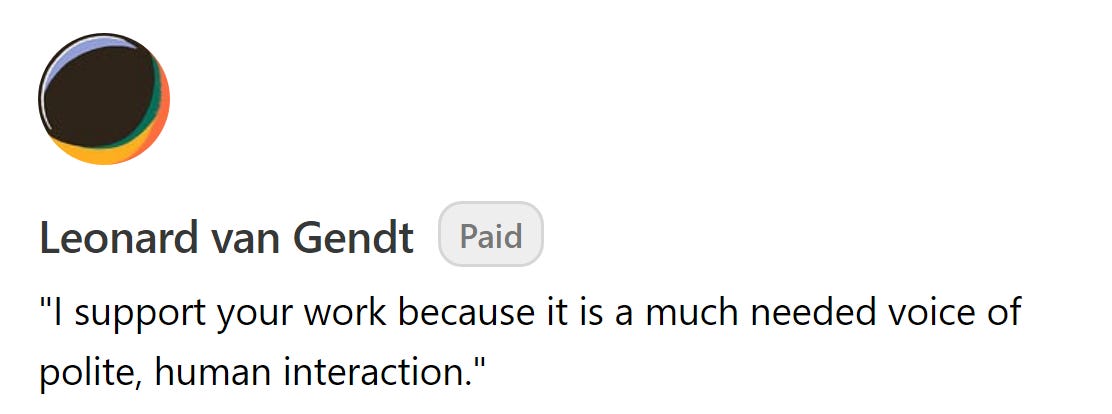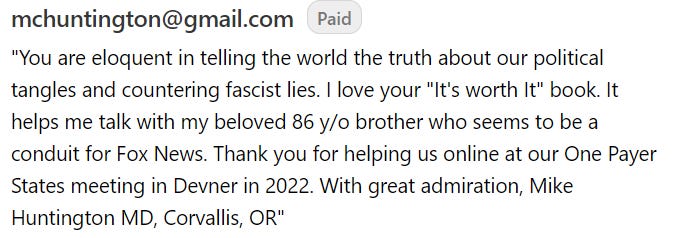Again, America ranks last in healthcare. Until we demand the only solution, nothing will change.
America ranks last in healthcare among industrialized countries. We should be ashamed that the richest country in the world is this bad at keeping its citizens healthy.
YOU CAN MAKE THE DIFFERENCE: This Project needs 25 new paid members today. Would you be willing to be one?
We are grateful for our Paid Subscribers and Free Subscribers. In this political climate, we need several hundred more Paid Subscribers. Misinformation funded by the deep pockets of our Oligarchy floods the internet. We are using all our platforms on-air, online, and in publications to counter that. We ask that you invest the equivalent of less than a coffee to ensure we can keep doing this effectively. Please invest in a Democracy that serves all of us by becoming a paid subscriber. It comes with many benefits.
America ranks last in healthcare.
The Commonwealth Fund annually releases a comparative analysis of healthcare systems from major developed nations. Year after year, the United States languishes at the bottom of these rankings despite its status as one of the wealthiest countries on the planet. The most recent report is no exception. The U.S. continues to spend more on healthcare per capita than any other country, yet consistently produces worse health outcomes. This isn’t simply an embarrassment—it’s an indictment of the American healthcare system or the lack thereof.
The reason the U.S. ranks so poorly is clear: it doesn’t truly have a healthcare system. Instead, it operates a sick-care system that prioritizes profits over patient care. In this system, healthcare is treated like any other commodity, where people’s well-being is a mere tool for generating enormous profits for private entities. The focus is not on providing comprehensive, universal care but maximizing returns for insurance companies, pharmaceutical corporations, and private hospital chains. This for-profit model of care creates a perverse incentive structure where keeping people sick and dependent on treatment generates more income than keeping them healthy.
Countries like Canada, France, and the United Kingdom have successfully implemented forms of universal healthcare. They all share a commitment to providing healthcare to everyone as a human right—not a privilege to be purchased by those who can afford it. The U.S., in contrast, allows its citizens to fall into medical bankruptcy at alarming rates. A visit to the emergency room or a routine surgery can result in financial ruin, even for those with insurance. Meanwhile, access to care is highly unequal, as those in lower-income states or regions without Medicaid expansion are particularly vulnerable to being shut out of the system altogether.
One of the greatest tragedies in this scenario is that Americans have been conditioned to believe that universal healthcare is either unattainable or undesirable. Political rhetoric—largely fueled by the private health industry—has convinced many that government involvement in healthcare would be inefficient and expensive. Yet, these arguments crumble in the face of evidence. Countries with single-payer or hybrid systems routinely spend less on healthcare while delivering better outcomes. The real inefficiency lies in America’s Byzantine healthcare bureaucracy, where insurance companies create layers of administrative waste as they compete to maximize profits rather than patient well-being.
According to the Commonwealth Fund’s findings, the U.S. has the lowest life expectancy and the highest rate of preventable deaths among the ten countries surveyed. This is a staggering failure, especially given the nation’s resources. High costs, long wait times, and geographic disparities severely restrict access to care. Ironically, those who oppose a single-payer Medicare-for-all system claim such a system would create the ills we currently live with long wait times, rationing, etc.
If you’re poor, in a rural area, or belong to a marginalized community, getting the healthcare you need becomes a near-impossible task. Even for those with coverage, basic procedures like MRIs or mammograms can take months to secure, which only worsens outcomes for treatable conditions.
Dr. Kavita Patel, a former White House Health Policy Director, underscores this failure in a recent interview, pointing out that the American system is not built around health but illness. People only see doctors when they are sick, and the system is geared toward responding to these crises rather than preventing them. In contrast, nations with more progressive healthcare models invest heavily in preventative care, keeping their populations healthier and reducing the overall cost of care.
The solution to this crisis is painfully obvious but politically elusive: a single-payer, nonprofit system. Single-payer healthcare is not a radical idea; it’s a proven model that works worldwide. By pooling resources into a single risk pool, a universal healthcare system would eliminate the profit motives that currently drive up costs and degrade care quality. It would prevent insurance companies from cherry-picking who they want to cover, ensuring everyone gets the care they need, regardless of their income or pre-existing conditions.
When profit is the guiding principle behind healthcare, decisions about patient care become distorted. A doctor may face pressure to recommend more expensive treatments, not because they are necessary, but because they generate more revenue. Consider dental care a microcosm: do you need that root canal, or could a filling suffice? In a profit-driven system, the patient’s health takes a backseat to financial considerations. This logic extends throughout the medical industry, from prescription drug pricing to hospital billing.
Political leaders must be held accountable for failing to reform this broken system. The Affordable Care Act (ACA), while a significant improvement over the status quo, is far from sufficient. Former President Donald Trump’s repeated attempts to dismantle the ACA without offering a meaningful replacement only highlighted how deeply entrenched the opposition to universal healthcare is in American politics. Yet, every attempt to strip Americans of their healthcare reminds the public of their precarious coverage, setting the stage for a broader demand for reform.
The U.S. healthcare crisis is not just a policy failure but a moral one. Every preventable death, every medical bankruptcy, and every person turned away from care is a testament to a system that prioritizes profits over people. A single-payer system is not just the most efficient solution—it’s the only ethical one. The time has come for Americans to demand it, loudly and clearly, from their elected officials. Until then, the U.S. will continue to rank last in healthcare, and the human cost will only grow.
Viewers are encouraged to subscribe and join the conversation for more insightful commentary and to support progressive messages. Together, we can populate the internet with progressive messages that represent the true aspirations of most Americans.
Can we count on your help to reach our goal of 300 needed new paid subscriptions by the end of the month?
The other side has big donors and everyday citizens who invest heavily in platforms that lie and misinform. All we have is you. So, please invest in our media outlet by clicking the subscribe button below to become a paid subscriber. You won’t miss that coffee, but it will make a difference in our politics as we spread the truth about our policies and progressive politics. All paid subscribers get to read my five books on this platform and all subsequent books I write. They will also be privy to subsequent incentives.









Thanks for this excellent summary of the US self-made healthcare crisis. The enabling universal-care legislation languishes on the desk of every US Rep (HR 3421, over a hundred co-sponsors) and Senator (S.1655, over a dozen co-sponsors). Politicians and the media respond with deafening silence. https://medium.com/@idember/bidens-silence-throws-30-million-uninsured-americans-under-the-bus-ad03a3438bb4.
Presidential candidate Kamala Harris previously supported universal care, aka Medicare for All. Now? Silence, a betrayal of families across America.
On the Republican side it's even worse. Trump wants to destroy the crappy coverage we have now. Not a single Republican lawmaker is on board with universal healthcare. Not one. Peer-reviewed studies reveal that over 36,000 deaths a year stem from lack of universal care. This death toll amounts to a 9/11 catastrophe striking our nation this month, next month, every month. As you read this, a hundred more body bags pile up every day -- strictly from our elected officials failure to act. https://medium.com/@idember/on-9-11-terror-stalks-america-but-not-why-you-think-936df7bdf94a
They know it. Eyes wide open. They are absolutely willing to sacrifice you and your loved ones to their own political expedience. A term for this intentional neglect is stochastic homicide: they don't know exactly which of their constituents will die as a result, only that some will. It's like a lethal lottery. https://medium.com/@idember/lethal-lottery-shirley-jacksons-horror-tale-times-ten-thousand-for-real-f4a48e1d593b
An election is coming up. Is your federal Rep on board? Look it up here: https://www.congress.gov/bill/118th-congress/house-bill/3421/cosponsors. How about your senators?
The Congressional Budget Office calculates that a public system like Medicare for All could essentially give your family an average $5,000 cash bonus every year — net cash saving, compared with what your household spends on healthcare today. That’s while fully covering you and your family for all needed healthcare. The CBO followed up with a second study, driving home the point: https://medium.com/@idember/pigs-fly-cbo-admits-medicare-for-all-will-aid-people-businesses-economy-e32d72ce59a2
Act now. The life you save could be your own. Or that of someone you love.